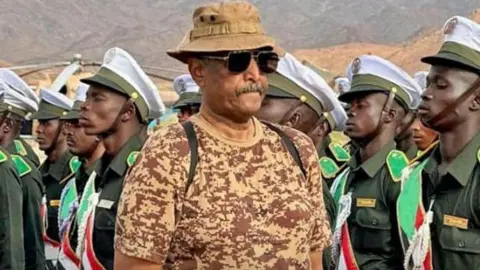Sudan's military leader survives drone strikes - army
 Sudan army
Sudan armySudan’s military leader Gen Abdel Fattah al-Burhan has survived an assassination attempt, the army spokesman has told the BBC.
Nabil Abdallah blamed the paramilitary Rapid Support Forces (RSF), which the army has been battling for the last 16 months for control of the country.
He said two drones had struck an army graduation ceremony killing five people at a base in Jabait in the east - territory under the control of the military.
But the RSF’s legal adviser told the Reuters news agency that the group, which has agreed to go to US-mediated talks next month, was not responsible.
Speaking after being evacuated to safety following the attack, Gen Burhan vowed to crush his opponents and ruled out negotiations.
"We will not retreat, we will not surrender, and we will not negotiate,” the AFP news agency quotes him as saying.
On Tuesday, his government had agreed to conditionally join the mediation in Geneva on 14 August.
Previous talks to end the conflict, which has created the world's largest humanitarian crisis, have failed as both sides have refused to honour their commitments.
More than 10 million people have fled their homes since the former allies fell out over an internationally backed political plan to move towards civilian rule.
The Jabait army base is about 100km (62 miles) from Port Sudan, the military’s de facto capital and where Gen Burhan is based.
Video footage being shared from those attending the ceremony on Wednesday morning shows military graduates marching in ceremonial dress before the sound of a strike.
“The only party that is hostile to the Sudanese people and targeting the Sudanese people is the rebel Rapid Support Forces,” Gen Abdallah told the BBC.
He thanked God that Gen Burhan and “all the commanders present are fine” and that there were not many major injuries.
However, Mohamed al-Mukhtar, legal adviser to the RSF, blamed the drone strikes on infighting within the military.
“The RSF has nothing to do with the drones that targeted Jabait today... they are the result of internal disagreements, between Islamists,” he told Reuters.
There have been allegations in the last few months that different factions in the army are at odds.
Some analysts point to an incident during the Muslim holy month of Ramadan in April when some commanders from a military brigade known as Abaraa Iban Malik were killed by drone strikes in the north-eastern town of Atbara.
This brigade may have been targeted by more moderate elements within the military itself as it is considered be made up of more hard-line Islamists opposed to peace talks, the analysts say.
However, others suggest that the RSF has increasingly been using drones to target army-controlled areas.
Only the army and RSF have access to drones, which have been widely used by both sides.
The Beja people, who live in this area between the mountains and the Red Sea coast, have tended to have a fractious relationship with those in power over the last few decades - often feeling ignored and marginalised.
These communities often fall out with each other too, but are generally supportive of Gen Burhan - despite resentment about living costs rising in Port Sudan because of the arrival of so many people fleeing the capital, Khartoum.
According to Reuters, the RSF has control of eight of Sudan's 18 state capitals, including Khartoum, and is expanding further into the south-east of the country.
The group, led by Mohamed Hamdan Dagalo, better known as Hemedti, accepted the US invitation to attend peace talks soon after they were proposed last week.
You may also be interested in:
 Getty Images/BBC
Getty Images/BBCGo to BBCAfrica.com for more news from the African continent.
Follow us on Twitter @BBCAfrica, on Facebook at BBC Africa or on Instagram at bbcafrica
